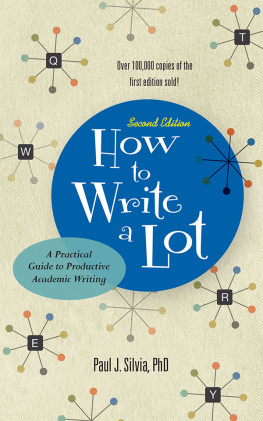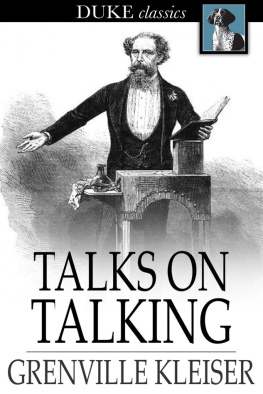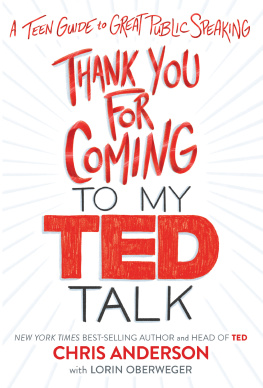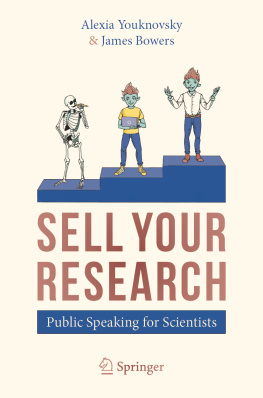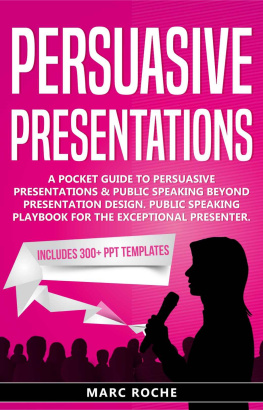Perhaps the most playful, informative, and easily digestible book on becoming an exceptional presenter. The thorough list of tips and strategies are tailor-made for psychologistswhether creating masterful conference presentations, perfecting job talks, or communicating effectively to the rest of the world (for whom statistical significance means nothing). This book is superb because these two authors are extremely entertaining and they know how to make ideas stick.
Todd B. Kashdan, PhD, Professor of Psychology, George Mason University, Fairfax, VA, and author of Curious? Discover the Missing Ingredient to a Fulfilling Life
Whether facing a conference presentation, job talk, or speech to the lay public, both new and seasoned academics will benefit from Feldman and Silvias lighthearted yet practical advice on public speaking. On topics ranging from knowing your audience to preparing good PowerPoint slides to managing anxiety, this book offers solutions to common speaker woes and highlights the pleasures of successfully communicating theory and research to others.
Monica Biernat, PhD, Professor of Psychology, University of Kansas, Lawrence
This book provides a realistic and humorous approach to the nuanced details of preparing talks. The authors do a wonderful job of making explicit and then masterfully defusing all the implicit fears that most speakers have. I recommend the book not only for graduate students and professionals who wish to improve their speaking but also for undergraduate psychology majors who are planning on attending graduate school.
Terri L. Bonebright, PhD, Chair and Professor of Psychology, DePauw University, Greencastle, IN
Graduate students and undergraduates (and even seasoned presenters) who devote an afternoon to reading this engaging book will likely come away with specific ways to enhance their research talks. Time well spent!
Annette L. Stanton, PhD, Professor of Psychology and Psychiatry/Biobehavioral Sciences, University of California, Los Angeles
This book is a must-read for students and early career psychologists at any experience level preparing for poster presentations, research discussions, or job talks. A valuable guide youll want to reference before, during, and after your proposal is submitted.
Kenneth R. Liberatore, PhD, Co-Chair, Committee on Early Career Psychologists, California Psychological Association
What a great resource for senior undergraduates, graduate students, and young professionals in psychology! Feldman and Silvia shed light on the overarching basics of effective professional communication and offer specific suggestions for various presentation formats. This little book is packed with practical advice, reassuring encouragement, and humorous examples that will help prepare novice presenters for forays into the important, and sometimes scary, world of professional speaking.
Jennifer S. Cheavens, PhD, Assistant Professor, Department of Psychology, The Ohio State University, Columbus
Public Speaking for Psychologists
A Lighthearted Guide to Research Presentations, Job Talks, and Other Opportunities to Embarrass Yourself
Copyright 2012 by the American Psychological Association.
All rights reserved. Electronic edition published 2012.
ISBN: 978-1-4338-0731-2 (Electronic edition)
Copyright 2010 by the American Psychological Association. All rights reserved. Except as permitted under the United States Copyright Act of 1976, no part of this publication may be reproduced or distributed in any form or by any means, including, but not limited to, the process of scanning and digitization, or stored in a database or retrieval system, without the prior written permission of the publisher.
Published by
American Psychological Association
750 First Street, NE
Washington, DC 20002
www.apa.org
To order
APA Order Department
P.O. Box 92984
Washington, DC 20090-2984
Tel: (800) 374-2721; Direct: (202) 336-5510
Fax: (202) 336-5502; TDD/TTY: (202) 336-6123
Online: www.apa.org/books/
E-mail:
In the U.K., Europe, Africa, and the Middle East, copies may be ordered from American Psychological Association
3 Henrietta Street
Covent Garden, London
WC2E 8LU England
Typeset in Minion and Goudy by Circle Graphics, Inc., Columbia, MD
Printer: Sheridan Books, Inc., Ann Arbor, MI
Cover Designer: Naylor Design, Washington, DC
Technical/Production Editor: Harriet Kaplan
The opinions and statements published are the responsibility of the authors, and such opinions and statements do not necessarily represent the policies of the American Psychological Association.
Library of Congress Cataloging-in-Publication Data
Feldman, David B.
Public speaking for psychologists : a lighthearted guide to research presentations, job talks, and other opportunities to embarrass yourself / David B. Feldman and Paul J. Silvia.
p. cm.
Includes bibliographical references and index.
ISBN-13: 978-1-4338-0730-5
ISBN-10: 1-4338-0730-0
ISBN-13: 978-1-4338-0731-2 (e-book)
ISBN-10: 1-4338-0731-9 (e-book)
1. Public speaking. 2. Psychologists. I. Silvia, Paul J., 1976- II. Title.
PN4192.P79F45 2010
808.51dc22
2009031065
British Library Cataloguing-in-Publication Data
A CIP record is available from the British Library.
Printed in the United States of America
First Edition
Contents
Preface
Although human beings are by nature an optimistic lot, we view some events with dread. Near the top of most peoples list of dreadsin between koalas coming down from the eucalyptus trees and rising up against humanity and caffeine declared a controlled substanceis public speaking. Few people take naturally to talking in front of an audience. They dont look forward to it, they dont volunteer to do it, and they dont do it as well as they could. But a career in psychology and its kindred fields could involve a lot of public speaking, so you should learn to do it well. With time and practice, you can become a confident, effective presenter.
Effective public speaking involves learning a few rules and tricks, practicing at home, and then getting out and doing your best. In this book, we cover the basic principles that apply to all scholarly presentations and then consider some common genres, such as research talks, posters, job talks, and presentations to lay audiences. Although our book has an audience of beginners in mindnewly minted professionals, graduate students, and advanced undergraduateswe hope that even grizzled veterans of the conference world will find something useful here.
We wrote this book using the time-honored tactic of dividing the chapters between the authors, so astute readers will notice slightly different writing styles. If youre curious to know who wrote each chapter, simply look for coordinating adverbs (Dave), asyndetic coordination (Paul), and actual scholarly references (Dave) instead of mere opinion (Paul). Or you could look for who wrote the chapters Woeful Tale of Woe. The order of authorship was determined via a complex set of factors: height, love of Mexican telenovelas, household cat-to-dog ratio, level of caffeine addiction, number of Volvos owned, and amount pledged to National Public Radio over the past decade. Despite our differences on these dimensions, we share responsibility (i.e., blame each other) for the books errors and flaws.
Next page

